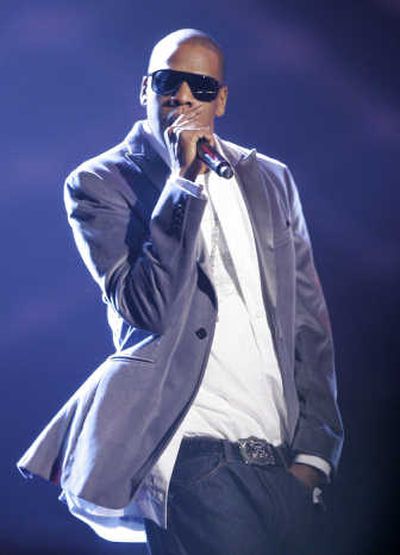Jay-Z’s ‘Story’

BROOKLYN – “See, that’s Fort Greene right there, the projects, and I went to school right here – this is George Westinghouse,” says Jay-Z, looking through the window of his gray Rolls-Royce as it chauffeurs him into his past.
“Marcy Projects is about five minutes straight down,” he says, pointing east toward the housing development where he lived as a youth. “See that? That’s one thing I liked about going to school here,” he adds with a smile, indicating a road sign that reads “Jay St.”
Jay-Z, 37, doesn’t return often to this Brooklyn neighborhood, where he grew up as Shawn Corey Carter. Stardom and wealth have taken him away to a Manhattan home and the globe-trotting life of a hip-hop star and major-label record executive.
It’s his role as a recording artist that has brought him back on a warm fall day, to rehearse for a taping of the “VH1 Storytellers” show on a soundstage at the Brooklyn Navy Yard.
As the car inches through afternoon traffic, past the courts where he used to play basketball and the corners where he once sold drugs, he finds that his emotions are stirred.
“Yeah, man, it’s the place that made me,” he says softly.
As it happens, Jay-Z’s physical homecoming parallels the artistic journey he made on his new album, “American Gangster,” which was released Tuesday.
He had no plans to make a record, but when he got an early look at the movie “American Gangster,” starring Denzel Washington as 1970s Harlem drug lord Frank Lucas, he was inspired to create an album based on the film – sort of.
“The album is not about the film,” explains the rapper, who completed the collection in a typically fast three weeks.
“It connected with me on an emotional level. It was so similar to the neighborhoods that I came up in, and things that happened there. And Denzel’s character as well … you know, his laid-back persona, that’s pretty much how I am.
“It’s really about the emotions of that life. I would take an emotion that I felt was important, or things that resonated with me … and make a song.
“But none of the emotions are current emotions. … It’s like writing a book, going back to all these things, these emotions that I thought were buried.”
Throughout a decade of popularity, an unusually long run in the hip-hop world, Jay-Z has sold about 25 million albums in the U.S. Such collections as “Reasonable Doubt ” (1996), “The Blueprint” (2001) and “The Black Album” (2003) are among the consensus classics in the hip-hop canon.
His taste for the unpredictable led to a 2004 collaboration with rock band Linkin Park. A writing collaboration with Coldplay’s Chris Martin on last year’s “Kingdom Come” was less notable, and the album, which ended a three-year retirement, was the lowest-selling and worst-reviewed of his career, with much criticism directed toward his lyrics about luxury products and exclusive resorts.
Jay-Z dismisses the concerns, claiming to be proud of the work and satisfied with the sales of about 1.5 million.
But as he gets ready to run through the seven new songs he’ll perform on “Storytellers” (Thursday, 9 p.m., cable channel 62 in Spokane, 42 in Coeur d’Alene), you get the feeling he wouldn’t mind making a point.
“American Gangster” is a three-act saga built on musical samples from the 1970s, the movie’s time frame.
“I think the truth is timeless,” Jay-Z says. “I mean, the music is ‘70s soul samples, but the emotions are forever. The truth goes across all boundaries and all time, I believe.
“I think the reason I’ve been able to have such a long career and still garner the kind of attention I can right now is because there’s truth there. People relate to that.
“And whether the truth is about an island in St. Tropez or is about Marcy Projects, it doesn’t matter, as long as it’s the truth.”
What he sees on the New York streets today is a vibrant culture that’s been moving to the rhythms and imagery of hip-hop for nearly three decades.
That reign is being questioned, as the genre’s CD sales have fallen even more sharply than those of pop music overall, and the bold artistry that made it a significant social and aesthetic force seems in short supply.
“It’s just the way of the world,” Jay-Z says of the sales decline. “Our fans are younger, so our fans live on computers.
“Other genres still have an adult audience, and as adults we’re not stealing music off the Internet. We’ll pay for the convenience of not having to wait for it to download, right? We will go to the store and actually pay for it just so we won’t have to deal with that.
“Kids, they’re on there all the time. … I think the consumption of hip-hop is the same, if not higher. It’s just not happening with sales.”
He’s more confident about hip-hop’s creative potential, even at a time when radio is dominated by disposable party jams with ambitions the size of ring-tones.
“Yeah, that’s affecting society as well, just in general,” he says. “Everybody wants a quick fix. But everything is not microwaveable. You have to invest into an entire work.
“That’s one of the reasons I’m proud of the album that I made, that it’s a complete piece of work. … Going about it like that in these times may not be the smartest thing to do, but I think it’s necessary.
“We have to mine it creatively and get back to being that voice, that social voice, a voice for oppressed people everywhere. I think as we grew we got away from some of those things, but that’s natural. … It’s growing pains. We’ll get there.”